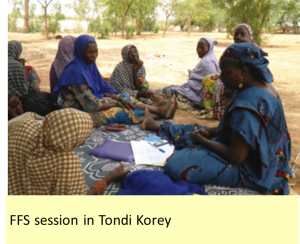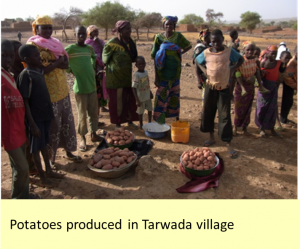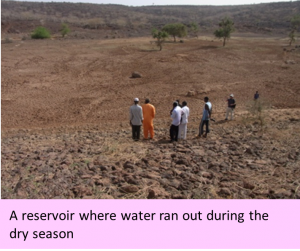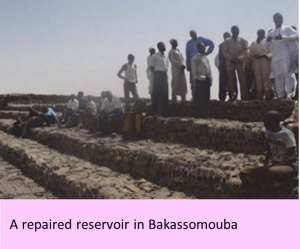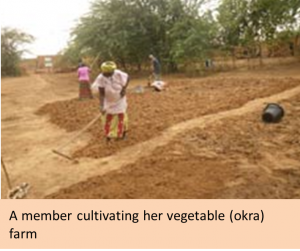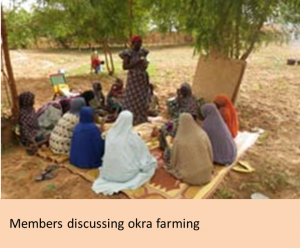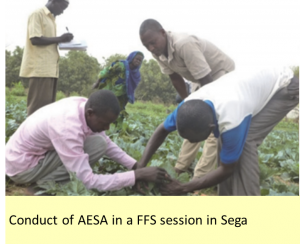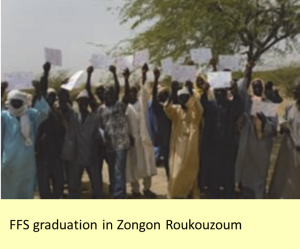#Reservoirs Management #Farmer Field Schools
Mr. Yoshihiko MACHI
NTC International Co., Ltd.
Project Summary
Realisation of self-sustained utilisation and management of reservoirs led by residents who were capacitated through the implementation of farmer field schools (FFS)
“Project on the Effective Utilisation of Reservoirs and Auto-Promotion of Local Communities in the Sahel” was a technical cooperation project by the Nigerian government and Japan International Cooperation Agency (JICA) conducted from March 2012 to December 2015. In this project, the reservoirs in the target area (comprised of Niamey Region, Maradi Region, and Tahoua Region) were repaired along with the establishment of cooperatives led by local residents for the maintenance and management of the reservoirs.
In addition, by implementing a technology transfer method known as farmer field schools (FFS), the following positive results were achieved: improvement of irrigation technology, empowerment of the participating farmers, and enhancement of solidarity among cooperative members.
Project Details
1. Establishment of cooperatives for repair works and maintenance management of small reservoirs
In the Sahel region of Niger, agricultural productivity is low due to unseasonable weather and lack of natural rainfall. Under such conditions, irrigation is an effective measure to achieve stable agricultural production. In the project’s target area, there had been several small reservoirs constructed by the government. But the local residents were less knowledgeable and experienced in utilising them effectively for agricultural production and improvement of their living conditions. They also lacked the know-how on maintenance management of reservoirs. Moreover, the dissemination and management system of the government was weak and so the reservoirs were not used efficiently.
As the result of the inventory survey carried out under the project, it was revealed that repair works were necessary in several small reservoirs, and this led to the repair of eight small reservoirs and excavation of wells in 14 sites.
For purposes of proper utilisation and maintenance, reservoir management cooperatives of local residents were established. And to capacitate the members to conduct the necessary operations to run the cooperatives by themselves, the project provided trainings on activity plan development; preparation and compliance with internal regulations; management of cooperative fund; holding of general meetings; and maintenance management of reservoirs like gabion repairing, dredging, and daily inspection.
Furthermore, in accordance with the cooperative members’ request, this project supported activities on agriculture, livestock, and tree planting that demonstrated the efficient utilisation of the reservoirs. Especially for the upliftment of agriculture, farmer field schools (FFS) was implemented in order to improve agricultural techniques that make use of the reservoirs.
2. Promotion of residents’ self-reliance through FFS
The farmers had never-ending issues related to agriculture. They said, “I would like to increase vegetable production by irrigation,” “I want to know proper application of fertiliser and pesticide,” etc. FFS aimed to resolve such issues by facilitating farmers’ groups composed of about 20 to 30 members to implement several comparative tests on crop/vegetable cultivation, through which they improved their agricultural skills. The farmers’ groups gathered once a week to have an FFS session about learning topics such as “Varietal comparison of lettuce using irrigation,” “Stems training techniques in tomato cultivation,” among others. The 2-hour sessions consisted of seven topics, and a sample programme of a session is shown in Figure 1.
Among all the FFS topics, agro-ecosystem analysis (AESA) was especially important. Members observed the growth of certain crops/vegetables in their farms, and made presentations on planting progress in front of all the members. Together, they analysed problems and considered ways to resolve these through group discussion. By observing the field regularly, the farmers became capable to detect problems like presence of pests at an early stage. Also, the FFS provided good training for assertiveness because the participants had many opportunities to make presentations and to express their opinions in front of group members. Moreover, group discussion during FFS sessions led to create locally acceptable techniques based on the knowledge and experiences of the members. In addition, FFS had an interactive recreation programme known as Group Dynamics wherein members enjoyed dancing, singing, and sharing of entertaining short tales or anecdotes. Thanks to this programme, group members became more sociable and gained motivations for their learning.
Thus, by implementing FFS, not only appropriate technologies were practiced, but also the empowerment of members was enhanced, and the solidarity among the members was improved.
In addition to strengthening the capacity of the members, this project contributed to reinforce the reservoir management cooperatives so that they were able to implement activities independently.
Table 1: Sample Programme of a FFS Session
| 1. Prayer; Roll-call |
| 2. Recap of last week’s session |
| 3. Agro-Ecosystem Analysis (AESA)
・Field observation and data collection ・Data processing ・Presentation and discussion |
| 4. Group dynamics |
| 5. Special topics |
| 6. Recap of the day |
| 7. Planning for next week’s activities |
3. Training of farmer-facilitators and establishment of project management system
Although the project area spread over three regions and conducted activities in a wide scope, the number of extension workers belonging to the Ministry of Agriculture was limited and thus increasing the number of project sites and farmer-beneficiaries became improbable. To address the limitations, two members were selected from each FFS group by considering their facilitation ability, motivation for agriculture, and knowledge of agricultural techniques, and then they had been trained to be farmer-facilitators. Under this project, 20 extension workers and 52 farmer-facilitators were trained to promote the project’s regional dissemination. Upon project completion, the FFS was implemented in 19 sites, and 347 members graduated from the programme.
As the FFS sites were widely scattered, it was difficult to travel around all the sites, and monitoring of the FFS was a problem. To know the situation of the local activities in a timely manner, the Nigerian government had regular meetings in two steps: (1) extension workers or farmer facilitator’s meeting –> Regional Agriculture Office meeting; (2) Regional Agriculture Office meeting –> Central Agriculture Office meeting. By communicating with extension workers or farmer-facilitators through the Regional Agriculture Offices, Central Agriculture Office became able to take flexible actions on various issues depending on local conditions.
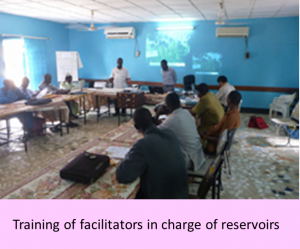
Table 2. Overview of the Project’s Accomplishments
| No. of Trained FFS Facilitators | No. of FFS Implemented | ||||
| Extension Officers | Farmer Facilitators which Implemented FFS | No. of FFS Sites | No. of FFS Groups | No. of FFS Graduates | |
| Tahoua Region | 7 | 18 | 6 | 15 | 85 |
| Maradi Region | 10 | 34 | 11 | 26 | 214 |
| Niamey Region | 3 | 0 | 2 | 2 | 48 |
| Total | 20 | 52 | 19 | 43 | 347 |
For more information, please check the manuals/reports
The technical manuals used for the trainings are available from the links below. These may be applied to other countries especially those in arid and/or semi-arid areas.
(1) Manuals
- [HAUSA tribe language] Analyse Agroécosystèmes (AESA)
- [HAUSA tribe language] Considérations importantes dans séance hedbdomadire
- [HAUSA tribe language] Utilisation Effective des Pesticides dans la Gestion Integratee de la Production et des Depradateurs (GIPS)

